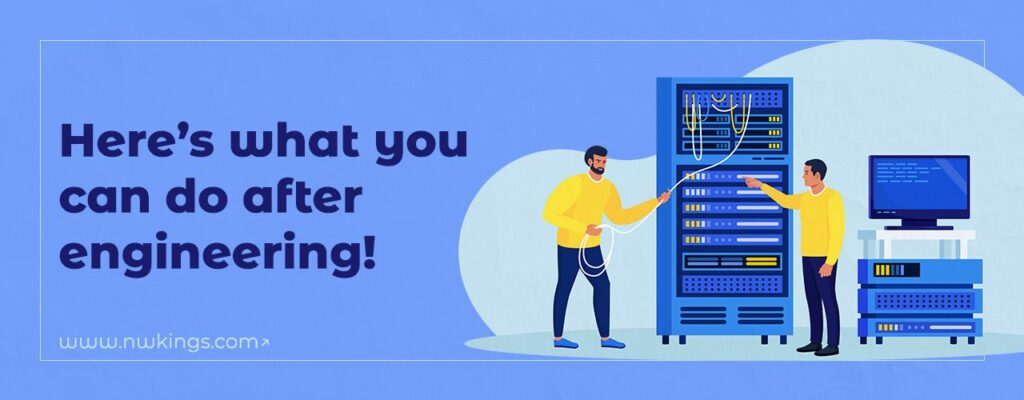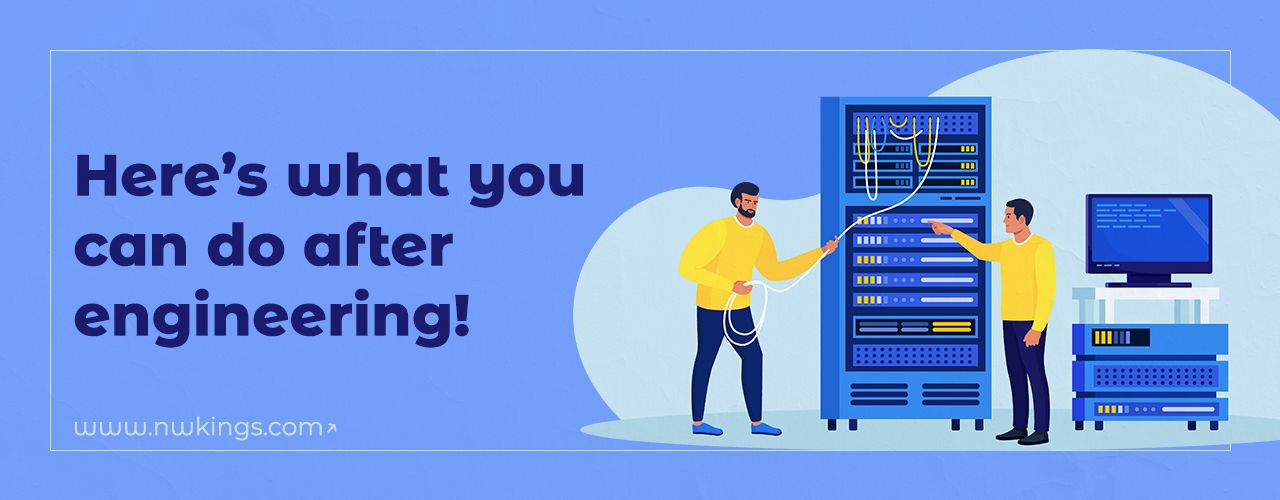
India annually produces over 15 lakh engineers yearly, as of 2021, with exceeding passion among Indians to become engineers. BTech is one of the most popular graduate courses without any doubt. However, many students get struck by this question during the fourth year of engineering – ‘what to do after Btech computer science?’.
If you’re looking for answer to this question, you have reached the right place. This blog discusses what to do after Btech? What are the various career options after engineering. Although most people look for jobs in engineering, there are many career routes individuals can take up after BTech for better job opportunities. One such way is looking for courses after BTech.
By opting for IT courses after engineering, you can refine your tech skills and land the most in-demand jobs in the industry. Based on your interest, you can either pursue these courses or you can go for higher studies. In this blog, we have discussed courses after BTech, higher studies after engineering, and other career options for engineers.
What to do after Btech?
After pursuing B.Tech, an individual can open the gateway to unlimited career paths; be it pursuing higher studies after engineering, looking for jobs in the field, or choosing a different pathway in the industry.
Top Career Options After Engineering B.Tech

The following are the various pathways you can choose according to your preference:
Higher studies after engineering:
One of the most conventional paths after pursuing B.tech is going for higher studies after engineering. You can go for an MTech which is a further extension of B.tech knowledge and skills. This option is the best for candidates who are not in a hurry to look for a job and can expand on engineering knowledge.
There are two main ways to gain MTech:
- Crack GATE exam: You can appear to take the Graduate Aptitude Test in Engineering (GATE) which can open the doors to enroll for MTech courses in top IITs/NITs. To crack this exam, one requires rigorous practice and acumen.
- Crack JAM exam: If you don’t want to pursue a B.tech, you can gain a Masters in engineering by taking the Joint Admission Test for Masters (JAM) which can help you gain admission in the masters programs of various top universities across India.
Applying for jobs after B.Tech:
A lot of individuals do not have the financial bandwidth and time to pursue a master’s degree. Then the question arises what to do after Btech. It could also be an individual’s choice to look for jobs after B.tech, which is completely fine. You can apply for the following job roles after B.tech:
- Software Engineer
- Mechanical Engineer
- Electrical Engineer
- Civil Engineer
- Data Analyst
- Network Engineer
- Biomedical Engineer
- Environmental Engineer
- Aerospace Engineer
- Industrial Engineer
- Quality Assurance Engineer
- Robotics Engineer
- Systems Analyst
- Electronics Engineer
- Chemical Engineer
- Renewable Energy Engineer
- Materials Engineer
- UI/UX Designer
- Project Manager (in various domains)
- Product Manager
You can choose any of the above job roles based on your interests, major in your B.tech, suitability to the roles, etc.
Pursuing technical courses after graduation:
Going for technical courses after B.tech can open the pathway to the best career options after engineering. This is because certifications are a great way to showcase your skills to recruiters. Certifications showcase your commitment to constant growth and can help you land a job faster.
Another great benefit of certifications is that you can keep up with industry standards and gain in-demand skills in a specific domain.
The following are the most popular courses after engineering that you can pursue for better job opportunities:
Cisco Certified Network Associate (CCNA):
If you want to pursue a career in networking or IT infrastructure then the Cisco Certified Network Associate (CCNA) is the best course after engineering. In the CCNA course you learn how to design, implement and manage networks. Along with it, you learn about the networking fundamentals such as network security, automation and programmability, etc.
You can land the following job roles after the CCNA course:
- Entry-level Network Engineer
- Network Administrator
- Technical Support Engineer
- Systems Engineer
- Information Technology (IT) Manager
- Network Security Specialist
- L1/L2 Network Engineer
- Network Security Engineer
- TAC Engineer
- NOC Engineer
- L3 Network Engineer
- Network Support Engineer
- Desktop Support Engineer
- Network and Hardware Engineer
- Routing and Switching – Network Security Engineer
- Wireless Network Engineer
- Technical Consulting Engineer
- Network Consultant
- Network Surveillance Engineer
- Voice Network Support Engineer
Microsoft Certified Solutions Associate (MCSA):
If you are curious about learning to design and build technologies using the Windows Server then the MCSA course offered by Microsoft. Although the MCSA certification is expired, the knowledge it imparts is still significant. It is important to strengthen the basics of Windows server and how it works, especially if you want to enter the cloud computing industry later on such as learning Microsoft Azure.
You can land the following job roles after MCSA:
- Network Administrator
- System Administrator
- IT Support Specialist
- Systems Analyst
- IT Consultant
- Database Administrator
- Cloud Administrator
- Security Administrator
- Virtualization Administrator
- Server Administrator
- Desktop Support Engineer
- IT Project Coordinator
- Network Security Specialist
- Systems Engineer
- Infrastructure Analyst
- Cloud Support Engineer
- Backup and Recovery Specialist
- Application Support Specialist
- Compliance Analyst
Palo Alto firewall:
If you want to enhance your career prospects in the IT infrastructure industry, then the Palo Alto Firewall is the best course to enroll in. Renowned as the world’s leading firewall, you can become an in-demand Network Security Engineer with the Palo Alto certification. You learn to configure, manage, maintain and troubleshoot networks and firewalls for optimized functioning of LAN, WAN, etc.
You can land the following job roles after taking the Palo Alto firewall course:
- Network Security Engineer
- Firewall Administrator
- Security Operations Center (SOC) Analyst
- Network Engineer
- Information Security Specialist
- Cybersecurity Consultant
- Security Solutions Architect
- Incident Responder
- Threat Intelligence Analyst
- Penetration Tester (Ethical Hacker)
- Security Consultant
- Security Compliance Analyst
- Network Architect
- IT Security Manager
- Cloud Security Engineer
- Application Security Analyst
- Network Operations Center (NOC) Engineer
- Security Systems Integrator
- Security Risk Analyst
- Network Infrastructure Specialist
Certified Ethical Hacking (CEHv12):
The CEHv12 course is one of the best courses after engineering when you want to kickstart a career in the cybersecurity industry. The Certified Ethical Hacking (CEHv12) course, offered by the EC-Council is the best course for learning hacking in accordance with the latest industry standards.
You learn various ethical techniques such as vulnerability assessment, social engineering, IoT hacking, cryptography, honeypots, hacking wireless networks/ web applications, etc.
You can land the following job roles after pursuing the Certified Ethical Hacking (CEHv12) course:
- Ethical Hacker
- Penetration Tester
- Cybersecurity Analyst
- Security Consultant
- Security Analyst
- Vulnerability Analyst
- IT Security Specialist
- Incident Responder
- Network Security Engineer
- Security Operations Center (SOC) Analyst
- Forensic Analyst
- Risk Assessment Analyst
- Security Compliance Analyst
- Security Auditor
- Security Engineer
- Threat Intelligence Analyst
- Application Security Analyst
- Red Team Operator
- Malware Analyst
- Cybersecurity Trainer
Microsoft Azure Administrator:
Cloud computing is one of the best careers for engineering students in India. The Microsoft Azure Administrator (AZ-104) certification is one such popular cloud computing certification that trains you to implement, manage and monitor a business organization’s Microsoft Azure environment that includes virtual networks, compute, storage, identity, security and governance.
You can land the following job roles after completing the Microsoft Azure Administrator (AZ-104) certification:
- Azure Administrator
- Cloud Administrator
- Systems Administrator (Azure)
- Cloud Operations Engineer
- Azure Infrastructure Engineer
- DevOps Engineer (Azure)
- Solutions Architect (Azure)
- Azure Security Engineer
- Network Administrator (Azure)
- Azure Governance Specialist
- Azure Compliance Analyst
- Azure Backup and Recovery Specialist
- Identity and Access Management (IAM) Specialist (Azure)
- Azure Support Engineer
- Cloud Consultant (Azure)
- Azure Deployment Engineer
- Azure Resource Manager Specialist
- Cloud Monitoring Engineer (Azure)
- Azure Automation Engineer
- Azure Policy and Governance Engineer
Amazon Web Services (AWS) Certified Solutions Architect – Associate:
The AWS certifications are the best career choice after engineering if you’re looking to pursue the best course after engineering. Being the leading vendor of cloud services, gaining an AWS certification can stand you apart from other candidates.
The AWS Certified Solutions Architect is an associate-level certification suitable for individuals looking to get a hang of AWS technology. You learn how to map on-premises to the cloud. You learn about networking, storage, compute, database, AWS Management console, AWS CLI, security services, AWS infrastructure, etc.
You can land the following job roles after pursuing the AWS Certified Solutions Associate:
- AWS Solutions Architect
- Cloud Architect
- Solutions Engineer
- Cloud Consultant
- Cloud Infrastructure Architect
- Cloud Systems Engineer
- DevOps Engineer (AWS)
- Cloud Security Architect
- AWS Infrastructure Specialist
- Cloud Automation Engineer (AWS)
- AWS Technical Account Manager
- Cloud Governance Specialist
- Cloud Performance Engineer (AWS)
- Cloud Application Architect
- AWS Cloud Engineer
- Cloud Integration Specialist
- AWS Migration Specialist
- Cloud Operations Engineer (AWS)
- Cloud Network Architect
- Cloud Cost Optimization Analyst
Pursuing MBA after B.Tech:
A Master of Business Administration (MBA) is one of the best career options after engineering. In fact, almost half of engineering graduates choose to pursue an MBA in various domains such as marketing, investment banking, Finance, Operations Management, business analytics, etc.
This two-year business-intensive program makes you proficient in business management. You can also choose entrepreneurship after pursuing MBA by following your passion for business.
After pursuing MBA, you can land the following job roles in blue-chip companies/top consulting firms such as McKinsey and Co., JP Morgan and Chase, BCG, etc.:
- Project Manager
- Sales Manager
- Brand Manager
- Strategy Consultant
- Healthcare Administrator
- Nonprofit Manager
- Retail Operations Director
- Business Development Manager
- Marketing Manager
- Financial Analyst
- Human Resources Manager
- Corporate Finance Analyst
- International Business Manager
- Risk Manager
- Operations Manager
- Management Consultant
- Supply Chain Manager
- Product Manager
- Investment Banker
- Entrepreneur
Applying for jobs in the PSU sector:
Another popular career after BTech is pursuing a job in the Public Security Undertaking (PSU) sector. You can apply to various PSU organizations such as LIC, BHEL, BARC, RBI, etc. Some of them require a GATE score but most of them don’t! You can earn a handsome salary by undertaking a job in the PSU sector.
Applying for Civil Services:
Civil services are considered to be the most honored and respected compartment in India. If you’re confused about what to do after Btech, You can choose to serve the nation by applying for the UPSC exam and becoming an IAS officer. You can also give exams to become a Forest Officer, IPS, etc.
You need to pass three stages to clear UPSC:
- Preliminary exam
- Written exam
- Interview
Where can you pursue technical courses after B.Tech?
If you want to pursue technical courses after BTech then it is important to gain hands-on skills in order to land a job in the tech industry. Therefore, you need to look for a training platform that covers concepts both practically and theoretically.
Network Kings is one such great platform where you can pursue technical courses by learning directly from top-notch Engineers with years of experience. Other benefits of enrolling in an IT course after engineering at Network Kings are as follows:
- You get 24/7 access to the largest virtual labs.
- You succeed over others when you attend live sessions led by well-known engineers with more than 12 years of expertise in the field.
- For a pleasant approach to study, there are also frequent professional Q&A sessions.
- You always have access to the session records.
- You can always seek help from career counselors for your professional problems.
- You are given a certificate of completion for the course.
- Additionally, you receive advice on how to create the greatest CV.
What are you waiting for? Book a free career guidance session today!
How to decide what should you do after engineering?
There are many career pathways to choose after engineering. However, it is always an individual’s subjective call on what he wants to do next. This choice can depend on various factors such as:
- What is your field of interest?
- Are you financially sound to pursue your area of interest?
- What industry do you wish to work in? Is it IT or business consultation?
- What are your ambitions?
- Do you wish to do a job in a private/government or PSU firm?
Based on answering these questions, you can easily choose what you want to do after engineering.
Is engineering a good career in India?

Living in India, pursuing an engineering career is the best choice that you can make if you wish to have financial abundance, career growth, and job stability. It is indeed one of the most sought-after career choices in the country.
The reasons why an engineering career is a great choice for any individual are mentioned below:
- Most in-demand professionals: Engineers are required in various industries such as IT, infrastructure, automotive, telecommunications, construction, business organizations, etc. This makes it evident that engineers are very much in demand.
- Unlimited career growth: An engineer can never stop growing in his career as he is faced with a different set of challenges and problems every day. This can give him a chance to shine! With time, you can move to more specialized and managerial roles in the industry.
- Gain global recognition: Many top-notch engineers are known for their invaluable contributions to society across the globe. You can also become globally recognized for your contributions.
- Developing new technologies: Engineers can heavily contribute to the R&D department of the nation. By working with various professionals, you can invent new machines/technologies and change the world.
It's a wrap!
After pursuing engineering, a lot of individuals have to face the question: after BTech which course is the best? In this guide, we have made it easier for you to figure out the answer to this question. We mentioned various career options after engineering that you can opt for after completing BTech.
Unlike any other degree, BTech gives you the flexibility to pursue whatever you want to and grow exponentially in your career. Be it getting a job in a consulting firm, working in a PSU firm or even starting your own business, BTech gives you the foundation to do the best in your life.
I hope this guide made things a little easier for you!
Frequently Asked Questions
You can do either of the following:
- Pursue a job as a BTech graduate.
- Puruse an MTech program.
- Apply for an MBA postgraduate program.
- Apply for jobs in the corporate sector.
- Apply for jobs in PSU/government sector.
- Take a UPSC exam to enter civil services.
Students can choose from the following specializations:
- Computer Science and engineering
- Chemical engineering
- Mechanical engineering
- Civil engineering
- Aerospace engineering
- Biotechnology
- Automobile engineering


